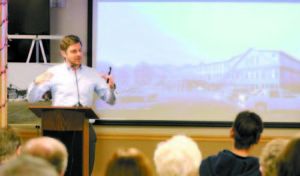New glitch surfaces on hotel plan; discussion recessed until Jan. 29

OVERVIEW OF CHANGES to the proposed Hotel Bridgton plan is given here by Michael Tadema-Wielandt, P.E. of Terradyn Consultants. (Rivet Photos)
By Wayne E. Rivet
Staff Writer
There will be no shiny, big red ribbon wrapped around an approved Hotel Bridgton concept — at least not in 2018.
After over six hours of project review, concerns raised by the public, and questions posed by planners on two hearing nights, Hotel Bridgton will enter 2019 with some major obstacles to clear.
Several new twists surfaced:
- Taking a close look at the site and layout of the 68-room hotel and banquet facility, Planning Board Chairman Steve Collins found that a piece of the structure was within the Stream Protection District. Regulations allow no waiver or variance within this zone. If the plan remained as presented, Collins called the inability to build within Stream Protection as a “show stopper.â€
The problem was brought to the developer’s attention — Justin McIver, owner of Main Eco Homes in Bridgton. Michael Tadema-Wielandt, P.E. of Terradyn Consultants told planners that an 8x11 inch map downloaded from the town’s website was used to plot the facility on the site.
“It’s about 10 feet within the 75-foot setback,†Tadema-Wielandt said. “Moving the building slightly back and rotating [it] to get out of the 75-foot setback, we can still retain design and parking. We had to modify the edge pavement and sidewalk to tie in front of the building under the new plan. The concept holds pretty well. It doesn’t affect the ability to build the parking area and allow vehicle movement. Officially, we resubmit [it] as a revised plan. Very minor changes to the concept and the way we intend to meet the Shoreland Zone.â€
- Planners followed the same process as last Wednesday’s hearing, allowing the applicant to address Shoreland Zoning standards point by point, then letting board members raise questions and concerns. Chairman Collins put a 9 p.m. curfew on the hearing, which drew some ire from residents looking to speak against the project.

KEEPING HISTORY IN MIND — Justin McIver tells the audience that he has gone to great lengths, including talks with historical groups, to design a hotel that reflects Bridgton's history.
Some residents, who have banded together as “Save Kennard Street,†hired Attorney David Lourie of Cape Elizabeth to represent their interests. Lourie, who handles zoning and land use matters, called the hearing process unfair and felt the project was not ready for public hearing, especially after being “tweaked,†resulting in the need for new calculations.
“We’re in overtime, so we’ll let you decide if you want to go on with this farce; deal with a plan that you still don’t really have,†he said as the clock neared 9:20 p.m. — closing time. “I think you understand what is going on here; it’s unfair to conduct a public hearing on a new plan.â€
By a 5–0 vote, planners decided to recess the hearing to Tuesday, Jan. 29, at 6 p.m. Code Enforcement Officer Robbie Baker recommended that the applicant provide project changes and additional information requested by planners at least 12 days before the scheduled hearing to allow board members and the public an opportunity to review data. Planners agreed.
Some highlights from the hearings (complete coverage of the two hearings can be seen via Lake Region TV):
- Planner Dee Miller expressed concerns regarding the traffic study. She had asked for camera footage to be taken, but a written report was filed.
“I distinctly remember in April asking for cameras, actually seeing turning patterns of automobiles. I feel it was totally overlooked and replaced by a set of numbers. In dealing with numbers, approximations, it can be applicable to any road (Portland Road or any place in town)? Skinny roads like Bacon and Kennard Streets being evaluated by the same data as Main Street or Portland Street?†she asked. “Will I be able to understand it [traffic study] because I am not a numbers person? You never know what is coming along [those streets]? Would those numbers reflect the unusual configuration of the street or would the numbers be applicable to a straight road?â€
McIver responded, “I do feel I’ve done 100% due diligence to hire a traffic engineer with 30 years more experience [recommended by the Department of Transportation] than anyone in this room. What more should I do? I hired an engineer to do this. If she said there was a concern, she would use a camera. It creates a burden on me…She studied the whole project to be sure it works.â€

HIRED BY OPPONENTS, the Save Kennard Street group, to represent their side of the matter is Attorney David Lourie of Cape Elizabeth.
Miller continued, “I have seen a study with a camera at the intersection of Food City and the bank. This was a time when people were thinking of a traffic circle. Seeing where cars and pedestrian were going, proved to us, a circle wouldn’t work. You can see those patterns better…I’d like to see camera work; I asked for it. Why not do it?â€
“Where is the limit to this? It creates a hardship on my end. I did my due diligence. What will the camera show you?†McIver asked. The traffic engineer will be in attendance at the next meeting to address traffic questions.
Miller added, “Where cars are going, how wide on the turn, how many cars turning into the gas station. What you are doing is taking lay persons and floating numbers in front of us, expect us to say okay. I asked for something and you didn’t even think about it.â€
- Planner Ken Gibbs raised concerns regarding setbacks, and felt that language in the ordinance suggests that parking lots count as structures, and thus could encroach on setback limits under the Site Plan.
Tadema-Wielandt pointed out that past projects reviewed by planners had not considered parking lots as “structures.â€
Gibbs noted that when a project, like Hotel Bridgton, is high profile with high stakes, “the letter of the regulation has to be followed in order to make it as clean a project as possible.â€
“I’m saying it hasn’t been interpreted that way,†Tadema-Wielandt countered. “My experience, it has always been applied to buildings…we’ll take a look at it.â€
Collins noted, “I remind the applicant, the applicant must meet the burden to code, be aware.â€
- Alternate Diane Paul questioned in the new “one way in and one way out†plan to access the facility from Bacon Street whether a point of access could be designated for emergency purposes?
Regards to safety? Emergency purpose, anything else?
“Originally, access to Kennard Street was removed after concerns were heard from the board and neighborhood. If it is the will of the board or if the fire department requests it, we could design a fence in a way to allow access to emergency vehicles only,†Tadema-Wielandt said.
- Regarding use of porous pavement as part of stormwater infiltration, Tadema-Wielandt pointed out that it will require sweeping and vacuuming to prevent sand, especially brought into the lot by visitors’ vehicles, from “clogging.â€
- On tree removal, the plan calls for 48 trees to be removed, all of which are outside of the Shoreland Zone. In shoreland zoning, some invasive plants along with five to six dead/diseased trees would be removed [under direction from the code officer].
- Planner Deb Brusini questioned the scale relation of Hotel Bridgton to its surroundings. “In relation to surrounding buildings, (the hotel) dwarfs them significantly. The question is whether scale is compatible (capable living in harmony) with the surrounding area,†she said. “If there is some type of scale model with street, trees and surrounding buildings it would help immeasurably [or by computer].
“We’ve heard public, chairman asking for information related to that; we would like the opportunity to put some information together to better understand how we think it meets that standard,†Tadema-Wielandt said.
- There were questions on adequate parking, especially if the hotel is at capacity and there is a function in the banquet/conference center. Gibbs felt that the proposed “satellite†parking space nearby should be part of the site plan review.
- Brusini sought clarification regarding wastewater disposal and “equivalent units†the town has awarded to the project; she also asked if some type of glass existed to shield room lights, thus preventing “light contamination†to abutters; and she wondered what clients were being targeted as a “boutique hotel.â€
McIver described the hotel as mid- to upscale with price on average at $150 per night. He noted that pool use would be restricted to patrons. When asked about his financial capacity, McIver said that due to past projects, he has been “qualified†for bank financing. Until the project is approved, specific financing terms won’t be available. Brusini would like to know a projected cost and payback terms.
“I plan to own the hotel and hire a management company to run it,†McIver said. He noted that the idea to build a hotel came from time spent the past six years building waterfront properties and hearing customers say there is no place locally for family and friends to stay.
“That’s why I am doing this project,†he said. “As CDC mentioned, they’re in 100% support of the project, and it’s in line with the Comprehensive Plan. I’ve worked with Maine Historic Preservation Commission on colors, window styles to keep in tradition character of Bridgton. I’ve been told that 100% [the hotel’s] location is where it should be; it would be catastrophic outside of the downtown; I want to connect with the downtown so people can walk versus drive…It’s not a Best Western. It’s a boutique hotel, which will be all about Bridgton…It’s not like I am taking a branded hotel and they tell me what to do. I want it to tell the story of Bridgton.â€
McIver did consider taking the conference centerpiece out of the project and build it elsewhere, but then considered the inconvenience it posed, both to developers and users.
“Working on this for six years, I’ve considered every single option; I’ve made significant changes based on feedback,†he added.
- Trash generated at the hotel would be removed and disposed of by a contractor [like Pine Tree Waste].


